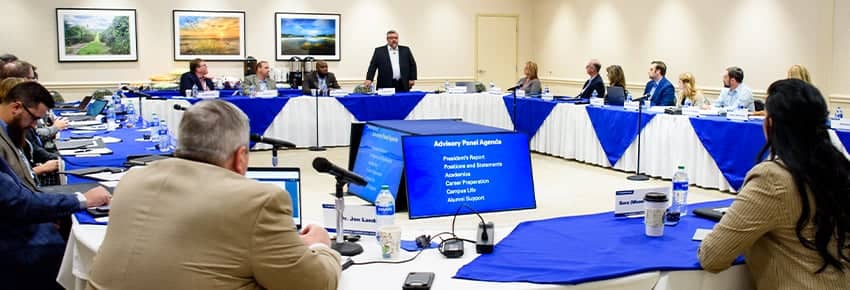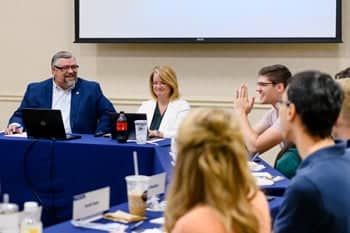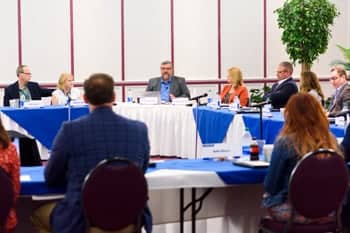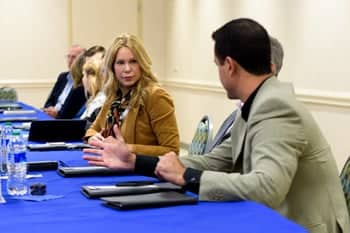
Mystery, intrigue, whispered tones, and secret boardroom meetings: in some places, people think of these words to describe the terms “executive” and “administration.” But that sense of mystery isn’t something Dr. Troy Shoemaker, president of Pensacola Christian College, wants to promote. To open communication and avoid mystery surrounding decisions, “Papa Shoe,” the student body’s nickname for PCC’s president, does his best to partner with current students and constituents in an effort to improve the level of service the College provides. Ensuring the College stays current and relevant for students is an immense task, but Dr. Shoemaker leads a variety of advisory panels each year to help make sure this happens.
Introducing the Panels
Dr. Shoemaker hosts panels comprised of groups the College serves: students, parents, alumni, pastors, business professionals, and educators. “These panels provide advisory feedback on how well we are meeting their needs,” Dr. Shoemaker shared. The groups range from meeting several times a semester to meeting every few years; the suggestions these panels give have been responsible for many improvements on campus.
“We try to have every division of the College represented adequately.”

When deciding who to invite to these panels, multiple factors are considered. “Depending on the discussion topics we make certain that there is variety [of members] based on age, geographic location, and different majors,” Executive Vice President Jon Lands explained. “We want to make sure there’s a balance and each demographic is represented adequately.”
Members of the Student Advisory Panel are elected individuals chosen by the student body—the year’s class and student body officers become members of this panel. “Because [student advisory members] are chosen by the student body, they are respected and well-spoken enough to represent the student body as a whole,” President Shoemaker said.
“Each [panel] comes with their own perspective that’s unique to them,” added Dr. Shoemaker. The variety of viewpoints and opinions are invaluable to PCC and help it continue in its endeavor to present the students with a high-quality college experience.
A Typical Panel Meeting
Each panel deals with different topics, but the meetings mostly follow the same pattern. “The meetings start with an introduction, stating the purpose and format,” Dr. Shoemaker explained. “Then I give them a behind-the-scenes look in the form of a president’s report, and I tell them things that aren’t necessarily published [to the public].”
Proverbs 27:17 defines each of these meetings well—“Iron sharpeneth iron; so a man sharpeneth the countenance of his friend.” President Shoemaker reminds members, “You’re sharpening us [the College] as a friend—you’re telling us what we need to hear, not what we want to hear; tell us the truth. You’re making us better and sharpening us.”

“There’s no head to the table, and everybody has a voice.”
To encourage a feeling of camaraderie and equality, members sit at a round table. “There’s no hierarchy,” said Dr. Shoemaker. “There’s no head to the table, and everybody has a voice.” After the president’s report, Shoemaker presents a question and opens the floor for discussion. When speaking with his Educators and Pastors Advisory Panels specifically, the question is always asked, “How can we partner with you better to improve our service in your ministry or work?” Members may either give their answers and present topics to discuss verbally or send in their questions and topics anonymously. Screens placed in the middle of the table display these anonymous questions and topics.
“There is a general agenda for the meetings, but we remain flexible to fully hear the panel’s thoughts,” said Dr. Lands. “The panelists are eager to help, and they are fully engaged in discussing the topic at hand.”
All panels meet in person. For some panels, such as the Students Advisory Panel, meeting on campus is easy; students meet with both, Dr. Shoemaker and his wife, Denise, in the Commons Florida Room. Because of the number of panel members, most meetings take place in MacKenzie Great Hall.
The Value of These Panels
“We have gained so much insight from these advisory panels,” President Shoemaker shared. “It helps us know whether we are headed in the right direction and whether the rationale [behind] what we’re doing is being [correctly] conveyed.”
Dr. Lands agreed and added an example, “A recent panel of alumni shared insights from their careers, ensuring our academic preparation aligns with the changing job market.”
“It speaks volumes that Dr. Shoemaker is willing to take time out of his busy schedule to listen to the perspective of others.”

The advisory panels have been instrumental in many campus improvements. The 3+ pass, which allows mixed groups to go off-campus together, is just one good example of positive changes resulting from discussions with current parents of PCC students.
“It speaks volumes that Dr. Shoemaker is willing to take time out of his busy schedule to listen to the perspective of others,” shared Dr. Elias Gonzalez (Pre-Medicine ’09), member of the Alumni Advisory Panel and local dentist. “I was able to sense how much PCC’s leadership cares for their students and wants their college experience to be as beneficial as possible to them, both academically and spiritually.”
